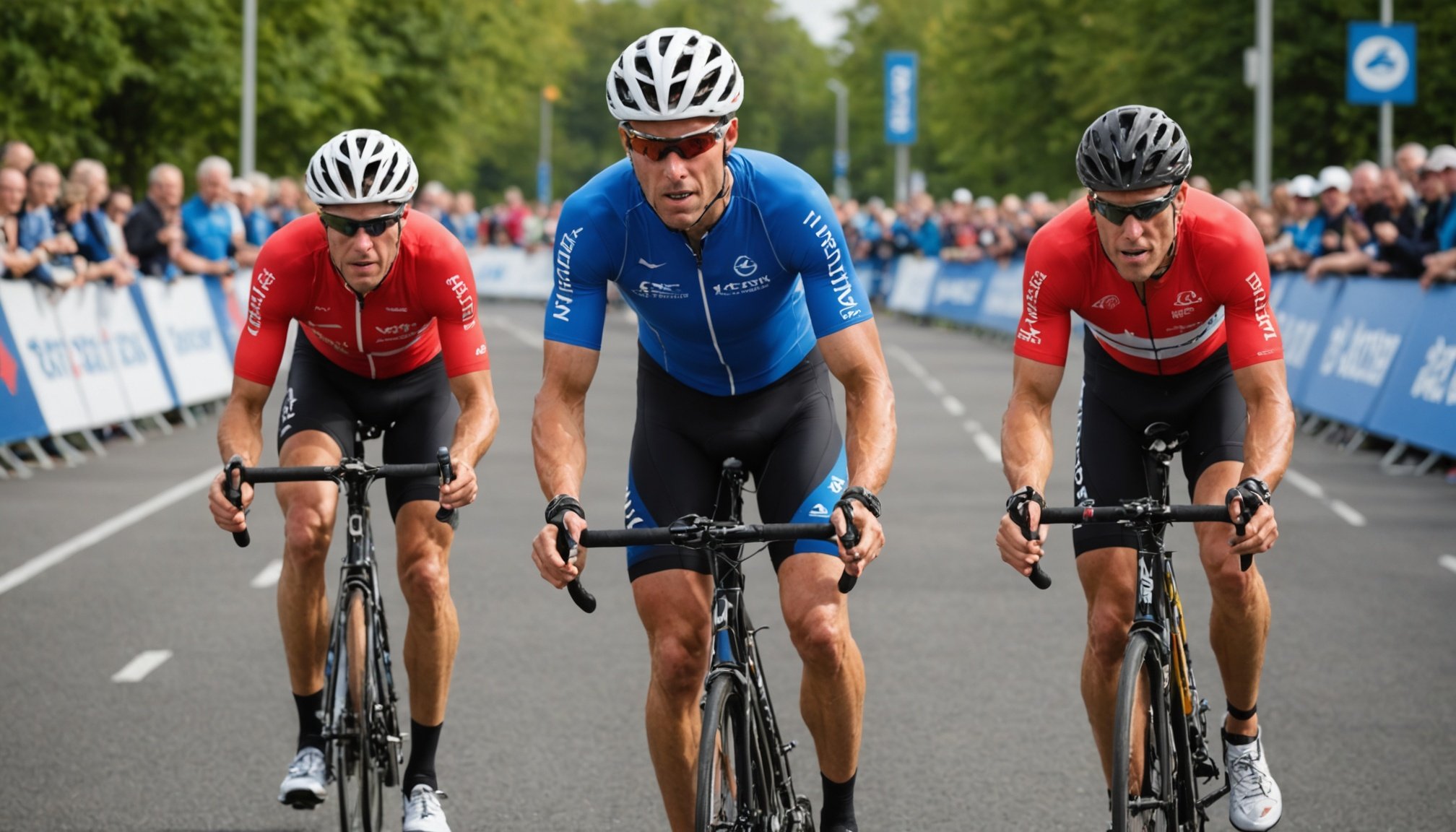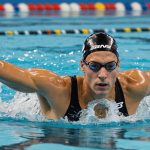Comprehensive Training Strategies for UK Triathletes
Balancing the three disciplines of swimming, cycling, and running requires a meticulous approach to triathlon training strategies. Training integration is crucial to ensure each discipline complements the others, thus enhancing performance optimization.
To structure a weekly training schedule for peak performance, athletes should distribute time efficiently among the three disciplines while incorporating rest days. A typical schedule might include:
Also read : Enhancing Family-Friendly Experiences: Strategies for UK Sports Venues to Attract Family Audiences
- Monday: Swim training focusing on technique and endurance
- Tuesday: Cycling to improve speed and stamina
- Wednesday: Running to build long-distance endurance
- Thursday: Cross-training activities like yoga or Pilates
- Friday: Rest day to recover
- Saturday: Brick workout combining cycling and running
- Sunday: Endurance swim or a free-form, relaxed session
The importance of periodization cannot be overstated. Dividing the training into cycles helps triathletes manage fatigue, progressively build endurance, and boost performance. Short-term goals keep the sessions dynamic and focused.
Cross-training offers a fresh dimension, preventing injury and promoting endurance by challenging different muscle groups. Integrating various training techniques ensures consistent improvement across swimming, cycling, and running disciplines. Whether amping up swimming skills, enhancing cycling efficiency, or refining running strategies, cross-training offers undeniable advantages for triathletes. Prioritizing deliberate strategy ensures peak performance in the rigorous field of triathlons.
Also read : Top Stretching Techniques to Help UK Athletes Avoid Injuries and Enhance Performance
Nutritional Guidance for Optimal Performance
Triathletes aiming for peak performance need a well-rounded approach to their nutrition. Understanding the ideal macronutrient breakdown is vital. Triathletes should prioritise carbohydrates, which typically make up 60% of their diet, as these provide the primary energy source for endurance activities. Protein, making up about 20%, is essential for muscle repair and recovery. The remaining 20% should come from healthy fats, crucial for sustained energy.
Hydration is equally important, especially given the variable UK climate. Athletes should stay attuned to their individual needs, adjusting water and electrolyte intake based on temperature and activity level. This ensures adequate hydration without overconsumption, thus maintaining performance without the risk of dilutional hyponatremia.
Pre-race fueling focuses on consuming easily digestible carbohydrates to stockpile energy reserves. This might include meals like pasta or rice paired with lean protein the night before, and a light breakfast such as oatmeal on race day. Post-race recovery meals should include a mix of carbohydrates and protein within the first 30 minutes after finishing — a smoothie with protein powder and fruit can be a quick, effective choice. Following these dietary tips ensures that triathletes optimize their performance capabilities across all phases of their race.
Recovery Techniques for Triathletes
Recovery is pivotal for any triathlete, ensuring optimal performance and longevity in the sport. Incorporating effective muscle recovery strategies can make all the difference.
Stretching and mobility exercises are cornerstone practices. Dynamic stretching before training and static stretching post-exercise significantly aid in muscle recovery. For triathletes, targeting specific muscle groups like the calves, hamstrings, and shoulders enhances flexibility and reduces the risk of injuries.
Injury prevention hinges greatly on sufficient sleep and rest days within training regimes. Studies highlight that quality sleep promotes muscle recovery and enhances overall performance. Consequently, scheduling at least one rest day per week is integral for repair and growth.
Therapeutic interventions, such as massage and foam rolling, play crucial roles in muscle recovery strategies. Massages help ease tension and improve blood circulation, while foam rolling works as a self-massage technique to release muscle knots and increase mobility. Implementing these techniques post-training promotes faster recovery, minimizing soreness and stiffness.
Recovery not only sustains the physical requirements of triathlon training but also enhances mental resilience. For those seeking to balance intense training regimens with effective recovery, these methods offer practical solutions tailored to this high-demand sport. Prioritizing recovery isn’t just a recommendation; it’s a necessity for every triathlete.
Psychological Preparation and Mental Resilience
Competing in a triathlon demands not only physical prowess but also a mental training regimen to develop a robust performance mindset. The intricacies of triathlon psychology are crucial, as they play a significant role in an athlete’s success.
To build mental toughness, athletes should consider implementing visualization techniques and mental rehearsal. These approaches are instrumental in conquering the physical and psychological demands of race day. By mentally rehearsing the race, envisioning every stage, and anticipating potential challenges, athletes can bolster their confidence and reduce performance anxiety.
Moreover, it’s beneficial to establish strategies for managing race day anxiety. Common techniques include focused breathing, progressive muscle relaxation, and the use of positive affirmations. By practicing focused breathing, athletes can maintain composure and sustain endurance throughout the race. Progressive muscle relaxation allows competitors to release physical tension that may result from pre-race jitters.
For example, creating a personal mantra can redirect negative thoughts and reinforce a positive performance mindset. Regularly engaging in these mental exercises can help foster a resilient psyche, prepared to withstand the challenges of a triathlon.
Ultimately, combining mental training with physical preparation enables triathletes to achieve a harmonious balance, enhancing their overall performance.
Insights and Case Studies from Experienced Triathletes
Gleaning triathlete insights from seasoned athletes provides a unique perspective on effective strategies and training methodologies. Numerous success stories from top UK triathletes underscore the diverse paths to success.
In a notable case study, professional triathlete Jessica Smith attributes her achievements to a well-rounded approach, integrating varied training methodologies. She emphasises the importance of consistency, stating, “Sticking to my routine, even when motivation dips, is key.”
Analyzing different training approaches reveals their effectiveness in varying contexts. For instance, high-intensity interval training (HIIT) proved beneficial for improving cardiovascular endurance while reducing training time. On the other hand, long-distance sessions fostered mental resilience needed in competition.
Additionally, interviews with seasoned athletes highlight the significance of learning from experience. James Martin, another successful UK triathlete, shared that understanding personal limits and gradually increasing intensity helped prevent injuries and ensured sustainable progress. He advised, “Listen to your body, rest is as crucial as training.”
These case studies illustrate that methodologies such as blending HIIT with endurance training, paying attention to nutrition, and mental preparation, can significantly enhance race performance. Through learning from the experiences of others, emerging athletes can refine their training strategies and achieve their goals more effectively.
Resources and Events for UK Triathletes
Exploring the vibrant world of UK triathlon events and training resources, athletes can find numerous opportunities to enhance their performance. Across the country, there are both challenging and community-oriented triathlons coming up, offering something for all levels of participants. From the serene rural landscapes hosting local sprints to demanding ironman events in bustling cities, there’s a fit for everyone.
For those looking to sharpen their skills, several training resources are available. Various camps focus intensively on this sport, providing expert coaching in triathlon training within top-notch facilities. These camps are ideal for refining techniques, achieving personal goals, and staying motivated. With experienced trainers offering personalized plans, athletes can anticipate significant performance improvements.
The supportive communities surrounding these events are invaluable. Engaging with community support networks offers emotional encouragement, camaraderie, and practical insights for better race preparation. Online forums and local groups gather triathletes to share experiences, tips, and even organise practice meets. These platforms foster a collective spirit and facilitate shared knowledge that benefits both novices and seasoned competitors.
Participating in these resources and events not only builds strength and endurance but also nurtures an encouraging environment where every triathlete can thrive, allowing for personal and communal growth in the sport.











